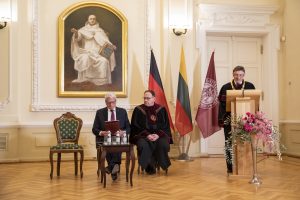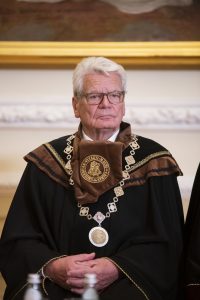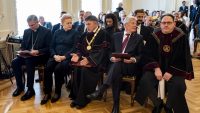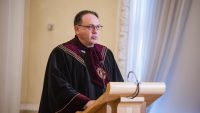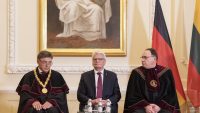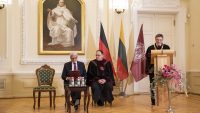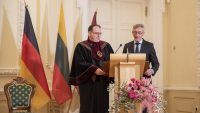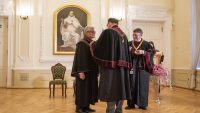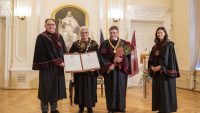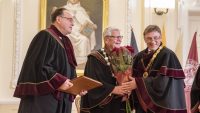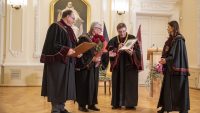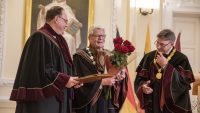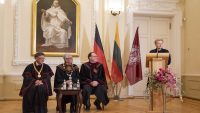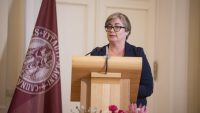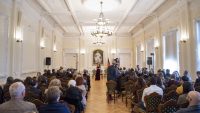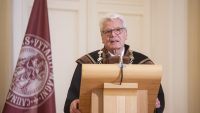VMU Honorary Doctor Regalia Awarded to Former President of Germany
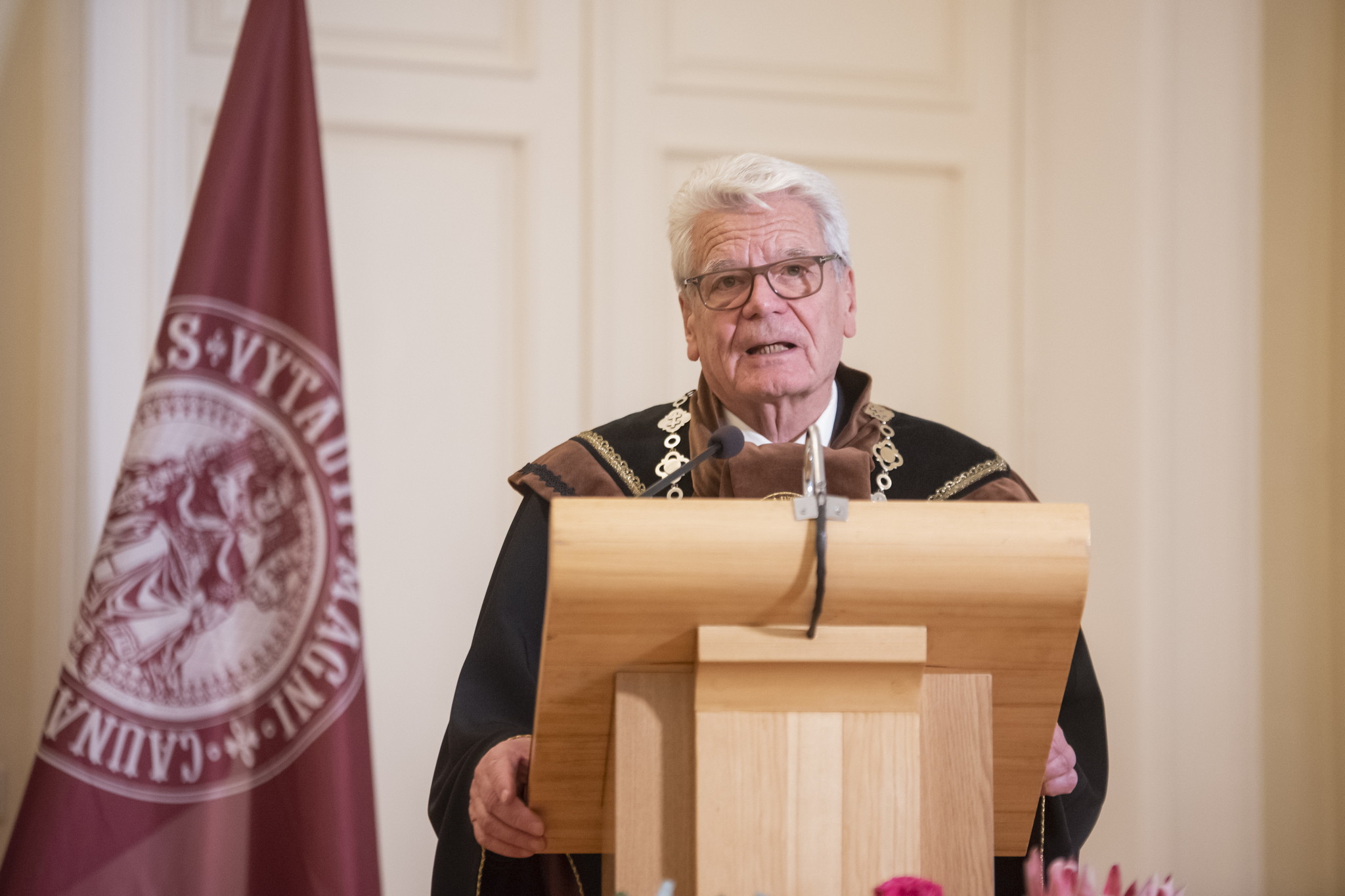
“Today’s Germany not only recognises its responsibility for the crimes of National Socialism, but also feels a special responsibility to defend freedom and the rights and dignity of all people. As a citizen and as the President of the country, I have always cared about spreading this message. Today, when I stand before you, you see not only a German, but also a kindred spirit, a friend of fate. The one who, after liberating himself from the dictatorship of the National Socialists, experienced the establishment of the new terror in the eastern part of his country, just like you in the Baltic States and in the other countries of Central Europe,” said Joachim Gauck, the former President of the Federal Republic of Germany, in his speech on Wednesday, as he accepted the regalia of VMU Honorary Doctor.
Dedicated his life to the fight against totalitarian communism
Joachim Gauck is granted the title of VMU Honorary Doctor for his achievements in the fields of international cooperation, peacekeeping and strengthening of democracy, and for his significant contribution to fostering the values of freedom, justice, and solidarity. Before becoming President, Gauck was actively involved in anti-communist protests in East Germany and founded the opposition movement New Forum, which contributed to the downfall of the Socialist Unity Party of Germany.
From 1990, he headed the Stasi Records Agency, which uncovered the crimes of the communist East German secret police. In 2008, he was one of the signatories of the Prague Declaration on European Conscience and Communism. In his academic work, Gauck has written extensively about Soviet concentration camps, communist crimes, and political repression in East Germany. From 2012 to 2017, he served as President of the Federal Republic of Germany. Today, for his achievements, he is considered one of the most prominent moral leaders of Eastern Europe and is compared to the former Czech President and Czechoslovak dissident Václav Havel.
“Joachim Gauck is a unique personality whose views and convictions are today actual more than ever. While Europe is facing a brutal war waged by the successor to the Soviet state not only against Ukraine but against freedom and democracy in general, there is no better moment to honour a man whose life has been dedicated to the fight against totalitarian communism and for freedom and democracy in general,” Prof. Juozas Augutis, the Rector of VMU, said explaining the University’s decision to honour Gauck.
During the event, former President of the Republic of Lithuania Dalia Grybauskaitė also congratulated the new VMU Honorary Doctor, noting that in her meetings with Joachim Gauck, she frequently spoke about European security and its future. “In 2016, after the occupation of Crimea, you were probably the only one in Germany who urged your country to take responsibility for the sake of Europe and security. Europe was unprepared, and Germany especially. You inspired me to meet with Chancellor Merkel and to ensure that Germany takes its responsibility and increases its military forces in Lithuania,” Grybauskaitė recalled.
The war against Ukraine is an attack on Europe
In his speech in Kaunas, the guest from Germany stressed the need to remain united and praised Ukraine for its successful defence in the war started by Russia. “Ukraine is defending itself from destruction boldly, intelligently and with increasing success. Here in Lithuania, you realised very early on that Russia’s war against Ukraine is an attack on Europe and on the entire Western world, an attack, in the true sense of the word, on democratic modernity, on human freedom and on the rule of law,” Gauck said, confirming that Germany will continue to provide financial, humanitarian, and military support to Ukraine.
According to the former German President, his country contributes to strengthening the preparedness of Lithuania’s defence not only because it is a response to a tangible Russian military threat, but also because of the desire to invest in the defence of common values.
In his speech, Joachim Gauck paid a lot of attention to history, in particular to the experience of Soviet totalitarianism that links Lithuania and East Germany. “The majority of German society has not known this new oppression, the constant arbitrariness and the resulting sense of helplessness. Meanwhile, you know exactly what I am talking about. Until 1989, we lived under the Soviet system, under constant surveillance, spying and persecution by the secret services. In this region, the democratic project of European modernity lost its power – the permanent impotence of the majority and the absolute power of the minority took hold,” the guest noted, also recalling the most important attempts to resist the Soviets – the uprising in Hungary, the Prague Spring, Solidarność (Solidarity), and the events in Lithuania.
The West should learn to value freedom
After the collapse of the Soviet Union, during Yeltsin’s rule, partnership with the major eastern neighbour seemed possible – but, according to Gauck, the strengthening of imperial thinking eventually replaced a relationship based on cooperation and equality.
“The turning point did not come, nor did the confrontation between East and West end. Here, in the eastern part of the European Union, this has been evident for some time. Today, no one can turn a blind eye to the fact that Putin’s regime is demonstrating its hostility towards us. The invasion of Ukraine and the brutal war crimes that we have witnessed since February this year have revealed Russia’s neo-imperialist ambitions,” Gauck said.
He argues that looking at Russia’s actions in recent years in Chechnya, Georgia, Transnistria and Crimea, there is a continuity – both Tsarist Russia and the Soviet Union were based on an imperial self-perception. After the collapse of the USSR, after a short period of opening up, this thinking became more and more pronounced. The idea of a common European security order including Russia remained only an illusion.
“We do not know how this war will end. But we do know what is at stake – not only for Ukraine, but for all free nations. In the 1990s, we rediscovered that Europe is a united space of freedom, with room for the small and the large; a space where the wounds of the past can be healed with the help of human rights, security, inclusion, solidarity and democracy,” the new VMU Honorary Doctor stressed, adding that Western Europe should take greater account of the perspective of Eastern Europe and learn to value freedom.
Thanking Vytautas Magnus University for the award of the title of Honorary Doctor, the former President of Germany said that he considers this award as a sign of close ties and strong solidarity between Lithuania and Germany.
The speech of the former President of the Federal Republic of Germany Joachim Gauck (in Lithuanian)
The speech of the former President of the Federal Republic of Germany Joachim Gauck (in English)
The speech of the former President of the Federal Republic of Germany Joachim Gauck (in German)
Joachim Gauck was awarded the title of VMU Honorary Doctor at a solemn meeting of the VMU Senate. This year marks the centennial of the University of Lithuania. Founded in 1922, the University, renamed Vytautas Magnus University in 1930, educated most of the intellectual, cultural and political elite of interwar Lithuania, most notably the country’s humanitarian intelligentsia and diplomatic corps.
The University has already awarded the titles of Honorary Doctor and Honorary Professor to more than a hundred persons who have contributed to Lithuania and the University, including President Valdas Adamkus, President of Latvia Vaira Vīķe-Freiberga, President of Poland Bronisław Komorowski, President of Ireland Michael Higgins, the first Head of State of the restored independent Lithuania Professor Vytautas Landsbergis, Secretary-General of the United Nations Ban Ki-moon, poet Czesław Miłosz, anthropologist Marija Gimbutas, and many others.

